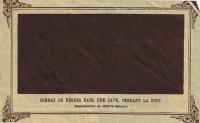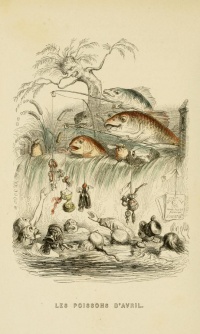Joke
From The Art and Popular Culture Encyclopedia

|
"A serious and good philosophical work could be written consisting entirely of jokes"—Ludwig Wittgenstein Rationale of the Dirty Joke (1968) a book on off-color humour and bawdry by Gershon Legman |

Illustration: Mona Lisa Smoking a Pipe by Eugène Bataille
|
Related e |
|
Featured: |
A joke is a short story or ironic depiction of a situation communicated with the intent of being humorous. A practical joke or prank differs from a spoken one in that the humor is mainly physical rather than verbal (e.g. placing salt in the sugar bowl, or more cruel "jokes" such that involve destruction of another's property).
Jokes are typically for the entertainment of friends and onlookers. The desired response is generally laughter, although loud groans of revealed stupidity are also a common response to some "dumb" jokes, such as puns.
Jocular is an English adjective meaning humorous, amusing or joking.
Contents |
Etymology
- From Latin iocus (“a jest”).
Antiquity of jokes
Jokes have been a part of human culture since at least 1900 BC. According to research conducted by Dr Paul McDonald of the University of Wolverhampton, a fart joke from ancient Sumer is currently believed to be the world's oldest known joke. Britain's oldest joke, meanwhile, is the "onion riddle, "a 1,000-year-old double-entendre that can be found in the Exeter Book.
A recent discovery of a document called Philogelos (The Laughter Lover) gives us an insight into ancient humour. Written in Greek by Hierocles and Philagrius, it dates to the third or fourth century AD, and contains some 260 jokes. Considering humour from our own culture as recent as the 19th century is at times baffling to us today, the humour is surprisingly familiar. They had different stereotypes: the absent-minded professor, the eunuch, and people with hernias or bad breath were favourites. A lot of the jokes play on the idea of knowing who characters are:A barber, a bald man and an absent minded professor take a journey together. They have to camp overnight, so decide to take turns watching the luggage. When it's the barber's turn, he gets bored, so amuses himself by shaving the head of the professor. When the professor is woken up for his shift, he feels his head, and says "How stupid is that barber? He's woken up the bald man instead of me."
There is even a joke similar to Monty Python's "Dead Parrot" sketch: a man buys a slave, who dies shortly afterwards. When he complains to the slave merchant, he is told: "He didn't die when I owned him." Comic Jim Bowen has presented them to a modern audience. "One or two of them are jokes I've seen in people's acts nowadays, slightly updated. They put in a motor car instead of a chariot - some of them are Tommy Cooper-esque."
Psychology of jokes
Why we laugh has been the subject of serious academic study, examples being:
- Immanuel Kant, in Critique of Judgement (1790) states that "Laughter is an effect that arises if a tense expectation is transformed into nothing." Here is Kant's two hundred and seventeen year old joke and his analysis:
"An Englishman at an Indian's table in Surat saw a bottle of ale being opened, and all the beer, turned to froth, rushed out. The Indian, by repeated exclamations, showed his great amazement. - Well, what's so amazing in that? asked the Englishman. - Oh, but I'm not amazed at its coming out, replied the Indian, but how you managed to get it all in. - This makes us laugh, and it gives us a hearty pleasure. This is not because, say, we think we are smarter than this ignorant man, nor are we laughing at anything else here that it is our liking and that we noticed through our understanding. It is rather that we had a tense expectation that suddenly vanished..."
- Henri Bergson, in his book Le Rire (Laughter, 1901), suggests that laughter evolved to make social life possible for human beings.
- Sigmund Freud's "Jokes and their Relation to the Unconscious". (Der Witz und seine Beziehung zum Unbewußten).
- Arthur Koestler, in The Act of Creation (1964), analyses humour and compares it to other creative activities, such as literature and science.
- Marvin Minsky in Society of Mind (1986).
- Marvin Minsky suggests that laughter has a specific function related to the human brain. In his opinion jokes and laughter are mechanisms for the brain to learn nonsense. For that reason, he argues, jokes are usually not as funny when you hear them repeatedly.
- Edward de Bono in "The Mechanism of the Mind" (1969) and "I am Right, You are Wrong" (1990).
- Edward de Bono suggests that the mind is a pattern-matching machine, and that it works by recognizing stories and behaviour and putting them into familiar patterns. When a familiar connection is disrupted and an alternative unexpected new link is made in the brain via a different route than expected, then laughter occurs as the new connection is made. This theory explains a lot about jokes. For example:
- Why jokes are only funny the first time they are told: once they are told the pattern is already there, so there can be no new connections, and so no laughter.
- Why jokes have an elaborate and often repetitive set up: The repetition establishes the familiar pattern in the brain. A common method used in jokes is to tell almost the same story twice and then deliver the punch line the third time the story is told. The first two tellings of the story evoke a familiar pattern in the brain, thus priming the brain for the punch line.
- Why jokes often rely on stereotypes: the use of a stereotype links to familiar expected behaviour, thus saving time in the set-up.
- Why jokes are variants on well-known stories (eg the genie and a lamp and a man walks into a bar): This again saves time in the set up and establishes a familiar pattern.
- In 2002, Richard Wiseman conducted a study intended to discover the world's funniest joke [1].
- Humour and Jokes have also been concluded to be logic that is completely random or vice versa.
Laughter, the intended human reaction to jokes, is healthful in moderation, uses the stomach muscles, and releases endorphins, natural "feel good" chemicals, into the brain.
Cycles
Folklorists, in particular (but not exclusively) those who study the folklore of the United States, collect jokes into joke cycles. A cycle is a collection of jokes with a particular theme or a particular "script". (That is, it is a literature cycle.) Folklorists have identified several such cycles:
- the Helen Keller Joke Cycle that comprises jokes about Helen Keller
- Viola jokes
- the NASA, Challenger, or Space Shuttle Joke Cycle that comprises jokes relating to the Space Shuttle Challenger disaster
- the Chernobyl Joke Cycle that comprises jokes relating to the Chernobyl disaster
- the Polish Pope Joke Cycle that comprises jokes relating to Pope John Paul II
- the Essex girl and the Stupid Irish joke cycles in the United Kingdom
- the Dead Baby Joke Cycle
- the Newfie Joke Cycle that comprises jokes made by Canadians about Newfoundlanders
- the Little Willie Joke Cycle, and the Quadriplegic Joke Cycle
- the Jew Joke Cycle and the Polack Joke Cycle
- the Rastus and Liza Joke Cycle, which Dundes describes as "the most vicious and widespread white anti-Negro joke cycle"
- the Jewish American Princess and Jewish American Mother joke cycles
- the Wind-Up Doll Joke Cycle
- The "Blond Joke" Cycle.
Charles R. Gruner discusses several "sick joke" cycles that occurred upon events surrounding Gary Hart, Natalie Wood, Vic Morrow, Jim Bakker, Richard Pryor, Princess Diana and Michael Jackson, noting how several jokes were recycled from one cycle to the next. For example: A joke about Vic Morrow ("We now know that Vic Morrow had dandruff: they found his head and shoulders in the bushes") was subsequently recycled about Admiral Mountbatten after his murder by Irish Republican terrorists in 1979, and again applied to the crew of the Challenger space shuttle ("How do we know that Christa McAuliffe had dandruff? They found her head and shoulders on the beach.").
Berger asserts that "whenever there is a popular joke cycle, there generally is some widespread kind of social and cultural anxiety, lingering below the surface, that the joke cycle helps people deal with".
List of jokes
- Two sides of a river
- A barber, a bald man and an absent minded professor
- You have two cows
- She thinks she's a chicken joke
- Situation Hopeless... But Not Serious
See also
- Anecdote
- Comedy
- Comedy genres
- Computational humor
- Dirty joke
- East Frisian jokes
- Feghoot
- Funny
- Humor
- Internet humour
- Irish jokes
- Joke chess problem
- Mathematical joke
- Paradox
- Poggio's Facetiae
- Polish joke
- Pun
- Punch line
- Roman jokes
- Russian jokes
- The Funniest Joke in the World
- The Joker
- World's funniest joke
References
- Rationale of the Dirty Joke (1968) a book on off-color humour and bawdry by Gershon Legman
- Žižek's Jokes (2014) by Slavoj Žižek


